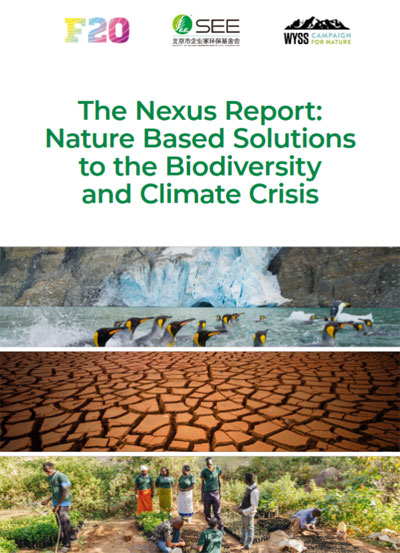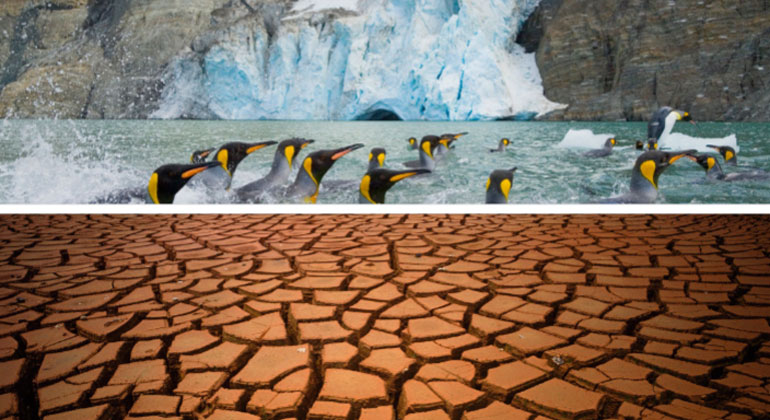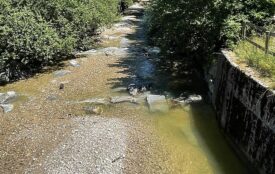The Nexus Report: Nature Based Solutions to the Biodiversity and Climate Crisis
F20 Nexus Report and the pivotal role of Nature-based Solutions for the biodiversity and climate crisis
Primary Forests, coastal ecosystems, fertile soils, specific ocean areas – all these are home to the world’s most important and diverse species of flora and fauna, and they are natural carbon sinks at the same time. These ecosystems play the largest potential role for three challenges: mitigating and adapting to climate change, slowing biodiversity loss, and reducing risk of future zoonotic pandemics. The protection of the world’s biodiversity and climate action are key for limiting the risks of future pandemics and therefore have to be an integral part of the G20 agenda this year.
Above was the premise for F20 and its partners, the Wyss Campaign for Nature (US) and the Society of Entrepreneurs and Ecology (China) to commission the lead author, Dr. Charles Barber at the World Resource Institute to write the ‘Nexus Report’. The idea was to develop concrete and actionable recommendations built on the principle of ‘Nature-based Solutions (NbS)’. Future decisions must not only avoid causing further damage to our planet’s ecosystems but strive to be ecologically and socially restorative. In this context the upcoming UN summits on biodiversity and on climate are of vital relevance for providing guidance to UN member states.
The report and its recommendations are tailored for negotiations at COP15 of the Convention on Biological Diversity (CBD), the UN Climate Change Conference (COP26) and to the G20 who represent around 80 per cent of the global GDP. Actions by these 20 countries will set the bar for success also in the other two conventions. Especially in the light of a newly elected US administration, G20 countries must now send a clear signal that protecting natural habitats could be the best mid- and long-term strategy to avoid future pandemics.
The recommendations highlight the need for significantly increased protection and restoration schemes with a focus on tropical forests and coastal ecosystems. It calls on the G20 nations to integrate nature-based solutions as a core element into their economic stimulus packages matching well with the motto of this year’s G20 summit to ‘safeguarding the planet’. However, this must be translated into concrete actions and existing stimulus packages of the G20 countries.
The urgency and importance of addressing major shortcomings of the current economic stimulus packages launched by the G20 nations in response to the Covid-19 crisis is also underlined by Vivid Economics and the F4B initiative. It is concluded that the current responses will fail to build back better by reinforcing negative environmental trends leading to further irreversible damages to nature and climate and the possible outbreak of new pandemics of zoonotic diseases.
Therefore, to catalyze the necessary global political will and mobilize coherent multilateral action, G20 efforts need to focus on

- explicitly reaffirming the principle reflected in both UNFCCC and CBD decisions, that the conservation of the most carbon-dense and biodiversity-rich natural ecosystems is a key priority for raising a climate change ambition in the UNFCCC framework, establishing a strong post-2020 Biodiversity Framework under the CBD and reducing risks of future zoonotic pandemics
- sending a strong political message to the UNFCCC and CBD on the need for more effective cooperation across the conventions around the adoption and scaling of Nature-based Solutions as a multi-purpose solution for climate mitigation and adaptation, as well as the conservation and sustainable use of biological diversity.
Preventing biodiversity loss, mitigating and adapting to climate change is practicable, cost-effective, and achievable. The conditions are already laid out in the Paris Agreement and the post-2020 framework for biodiversity. Too often, however, biodiversity and climate change are dealt with in relative isolation, including in how governments and other stakeholders organize themselves to act on these two inextricably linked issues. If action on climate change explicitly and systematically takes biodiversity conservation into account, we can generate synergies and positive feedback loops, with respect to generating political will, mobilizing financial and technical resources, and taking action on the ground.
- Studie „The Nexus Report – Nature Based Solutions to the Biodiversity and Climate Crisis“
- Bericht ‚Greenness of Stimulus Index‘ von Vivid Economics und Financing for Biodiversity
- Hintergrund: Aktuelle Studie von UNEP-WCMC: Strengthening Synergies: How action to achieve post-2020 global biodiversity conservation targets can contribute to mitigating climate change








